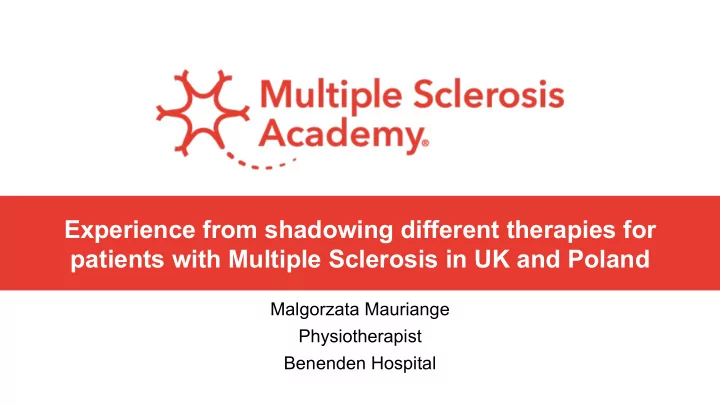

Experience from shadowing different therapies for patients with Multiple Sclerosis in UK and Poland Malgorzata Mauriange Physiotherapist Benenden Hospital
Therapies applied in Poland • Therapies Programmes are developed and based on the specifications taken from the following documents: • European Multiple Sclerosis Platform (EMSP) and Rehabilitation in Multiple Sclerosis (RIMS) • International Classification Functioning, Disability and Health (ICF)
Therapies applied in Poland • The patients are referred for complex therapies to the treatment centre for 30 days, once a year. • Referrals are inevitably made by a consultant who has been treating the patient. • The rehabilitation centre provide food , accommodation and treatments for the patients, which are partially funded by the Polish NHS and the balance from patients.
Therapies applied in Poland • The Patient’s Assessment is undertaken, using an Expanded Disability Status Scale. • The assessment is carried out by a Consultant neurologist, Physiotherapy team and nurses.
Daily programme of treatments • Individual neuro-physiotherapy treatment based on Proprioceptive Neuromuscular Facilitation (PNF), Bobath, Vojta , post –isometric relaxation of the muscles.
Daily programme of treatments • Group exercises (e.g. morning gymnastic, circuit training)
Daily programme of treatments • Cryotherapy treatment
Daily programme of treatments • Hydrotherapy treatment
Daily programme of treatments • Upper limbs Therapy with elements of occupational therapy (e.g. cooking classes, exercise program for hand mobility with individual application of Lyapko balls and rollers)
Daily programme of treatments
Daily programme of treatments Physical Therapy /Physiotherapy is a treatment which uses physical phenomena such as: • Generation of heat and light • Laser radiation therapy • Currents • Ultrasounds • Magnetic Fields This helps patients reduce tension in muscles, relieves pain and swelling and accelerates the regeneration processes.
Additional available treatments In the centre, patients have access to: • Counselling • Speech therapy • Group therapies such as: . Logotherapy, . Health psychology
Additional available treatments They also have access to: • Meditation On a daily basis, patients can participate in meditation sessions. The Director of the Centre meditates with patients every Friday to show support and motivate them. • A Nutritionist
Therapies applied in United Kingdom • The MS therapy centres that I visited are individual charitable organisations with dedicated volunteers and donors who give freely of their time and money. • The centres receive funding from local NHS boards, but most of them, are reliant on donations and fundraising activities for their income. • The centres work on a self-referral basis and offer only daily treatments.
Available treatments • Individual physiotherapy sessions • Acupuncture • APS • Hydrotherapy and aqua yoga • Massages (various techniques) • Group exercises (e.g. pilates, yoga) • Oxygen therapy
Kent MS Centre in Canterbury
Sussex MS Centre
Complementary therapy The experiences that captured my curiosity and interests in learning during my visit to MS centres inspired me to further enhance my knowledge in complementary therapies such as: • Oxygen therapy versus Buteyko Breathing Method • Lyapko applicators It would be beneficial for me as a practitioner, to have a better understanding of these techniques, in management of pain, weakness and fatigue, which are the main symptoms of MS sufferers.
Complementary therapies
Summary As a physiotherapist, my main interests are focused on therapies rather than conventional medicine as a form of treatment. The following differences were noticed during my project: • Selection and variety of equipment • Facilities for inpatient care • Management / treatment of patients with MS • Funding of treatment • Duration and complexity of therapies
Summary Observing both countries I realised the difference of approach for treatment. A lot of the complementary therapies offered in England are part of the basic treatment in Poland, funded by the Polish NHS. While in England medication is widely prescribed by the NHS, in Poland, people are going through a selection process in order to be accepted for different trial programs that can last up to 3 years.
The Polish Rehab Centre invites people from abroad to attend the treatment therapies. The staff and therapists can speak English and other European languages. Some British patients with MS have already visited and received treatment in Poland.
Thank you for your attention.
Recommend
More recommend